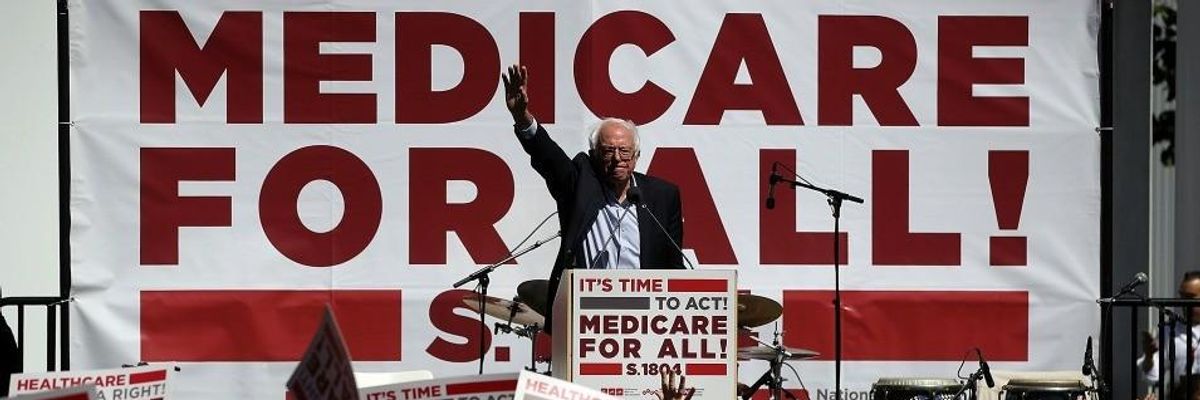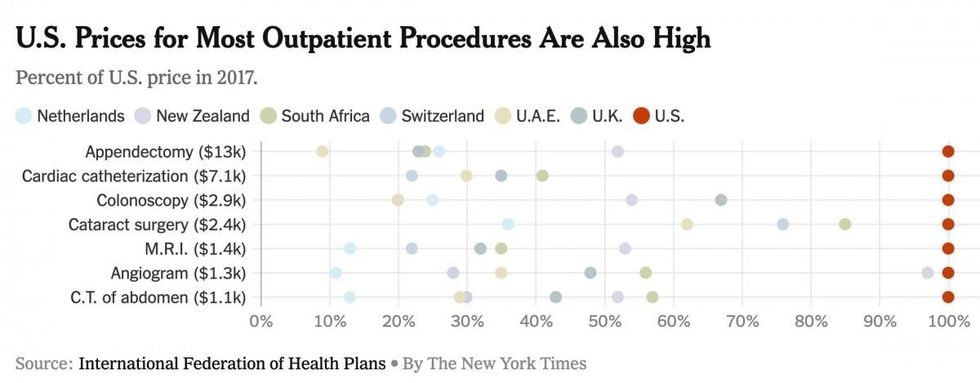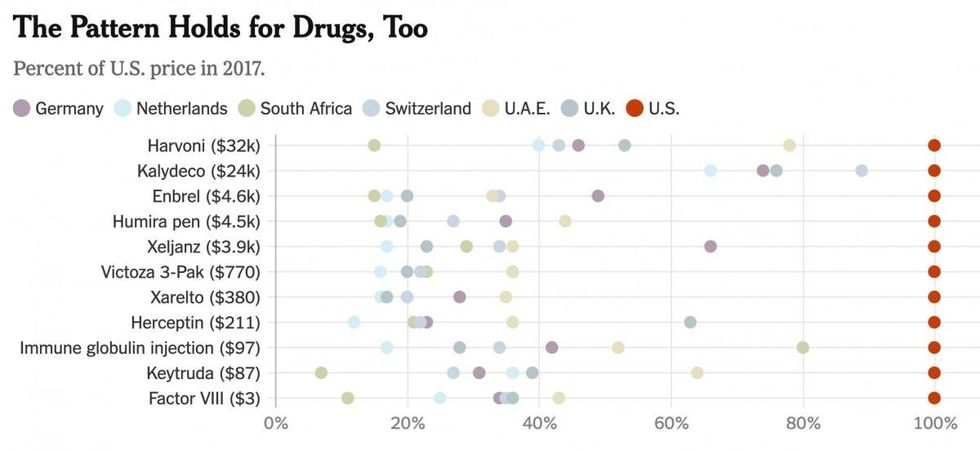

SUBSCRIBE TO OUR FREE NEWSLETTER
Daily news & progressive opinion—funded by the people, not the corporations—delivered straight to your inbox.
5
#000000
#FFFFFF
To donate by check, phone, or other method, see our More Ways to Give page.


Daily news & progressive opinion—funded by the people, not the corporations—delivered straight to your inbox.

Sen. Bernie Sanders (I-Vt.) has been a leading proponent of extending the Medicare system to all Americans--a proposal that's gained popularity among the public in recent years as well as traction in Washington, D.C. (Photo: Justin Sullivan/Getty Images)
Sen. Bernie Sanders doubled down on his argument for establishing a universal, single-payer healthcare system Friday in response to a New York Times report which showed the cost differences of hospital care, outpatient procedures, and prescription drugs in the United States compared with other countries.
"Other major countries cover all their people and pay half of what we do. Don't tell me we can't afford Medicare for All," tweeted Sanders (I-Vt.), a candidate for the Democratic Party's 2020 presidential nomination who has campaigned on implementing a single-payer system.
Sanders linked to the Times piece, which features graphs showing prices for common medical services around the world. The Times uses 2017 data from a report released this month by the International Federation of Health Plans, a group that represents chief executives of health insurers.
"Every time, the upshot is vivid and similar: For almost everything on the list, there is a large divergence between the United States and everyone else," the newspaper notes.
The Times highlights specific examples of cost differences, some of which Sanders shared on Twitter:
For a typical angioplasty, a procedure that opens a blocked blood vessel to the heart, the average U.S. price is $32,200, compared with $6,400 in the Netherlands, or $7,400 in Switzerland, the survey finds. A typical MRI scan costs $1,420 in the United States, but around $450 in Britain. An injection of Herceptin, an important breast cancer treatment, costs $211 in the United States, compared with $44 in South Africa. These examples aren't outliers.
There are so few cases where the United States price isn't the highest that they jump out. Cataract surgery costs more in New Zealand; Kalydeco, a new drug for cystic fibrosis, costs more in the United Arab Emirates. But for most of the studied cases, prices for services and drugs in other developed countries are less than half of those in the United States.
"It is staggering how much the United States is more expensive," said John Hargraves, the director of data strategy at the Health Care Cost Institute, a group that aggregates claims data from several large American insurance companies and provided the U.S. data to the study.
See the graphs below:



"Higher prices are not new for the United States," the Times explains, "but they have become newly salient, as more health insurance comes with high deductibles and other forms of cost sharing that require patients to pay a larger part of the bill or even the full cost of their care."
The Times acknowledges that two White House hopefuls--Sanders and Sen. Elizabeth Warren (D-Mass.)--have put forth single-payer plans that would rely on a government insurer to set prices as part of their presidential platforms, and that "both campaigns assume substantial savings would result as that government system lowered prices across the board: for doctors, hospitals, medical devices, and drugs."
Sanders introduced the Medicare for All Act of 2019 (S. 1129) in the Senate in April. Although Warren and Sen. Cory Booker (D-N.J.), another 2020 presidential contender, are among the bill's original co-sponsors, Warren has come under fire from progressives for a "transition plan" she proposed last month while Booker--as The Washington Post has reported--is among the candidates who don't believe we need to get rid of private health insurance.
Dear Common Dreams reader, The U.S. is on a fast track to authoritarianism like nothing I've ever seen. Meanwhile, corporate news outlets are utterly capitulating to Trump, twisting their coverage to avoid drawing his ire while lining up to stuff cash in his pockets. That's why I believe that Common Dreams is doing the best and most consequential reporting that we've ever done. Our small but mighty team is a progressive reporting powerhouse, covering the news every day that the corporate media never will. Our mission has always been simple: To inform. To inspire. And to ignite change for the common good. Now here's the key piece that I want all our readers to understand: None of this would be possible without your financial support. That's not just some fundraising cliche. It's the absolute and literal truth. We don't accept corporate advertising and never will. We don't have a paywall because we don't think people should be blocked from critical news based on their ability to pay. Everything we do is funded by the donations of readers like you. Will you donate now to help power the nonprofit, independent reporting of Common Dreams? Thank you for being a vital member of our community. Together, we can keep independent journalism alive when it’s needed most. - Craig Brown, Co-founder |
Sen. Bernie Sanders doubled down on his argument for establishing a universal, single-payer healthcare system Friday in response to a New York Times report which showed the cost differences of hospital care, outpatient procedures, and prescription drugs in the United States compared with other countries.
"Other major countries cover all their people and pay half of what we do. Don't tell me we can't afford Medicare for All," tweeted Sanders (I-Vt.), a candidate for the Democratic Party's 2020 presidential nomination who has campaigned on implementing a single-payer system.
Sanders linked to the Times piece, which features graphs showing prices for common medical services around the world. The Times uses 2017 data from a report released this month by the International Federation of Health Plans, a group that represents chief executives of health insurers.
"Every time, the upshot is vivid and similar: For almost everything on the list, there is a large divergence between the United States and everyone else," the newspaper notes.
The Times highlights specific examples of cost differences, some of which Sanders shared on Twitter:
For a typical angioplasty, a procedure that opens a blocked blood vessel to the heart, the average U.S. price is $32,200, compared with $6,400 in the Netherlands, or $7,400 in Switzerland, the survey finds. A typical MRI scan costs $1,420 in the United States, but around $450 in Britain. An injection of Herceptin, an important breast cancer treatment, costs $211 in the United States, compared with $44 in South Africa. These examples aren't outliers.
There are so few cases where the United States price isn't the highest that they jump out. Cataract surgery costs more in New Zealand; Kalydeco, a new drug for cystic fibrosis, costs more in the United Arab Emirates. But for most of the studied cases, prices for services and drugs in other developed countries are less than half of those in the United States.
"It is staggering how much the United States is more expensive," said John Hargraves, the director of data strategy at the Health Care Cost Institute, a group that aggregates claims data from several large American insurance companies and provided the U.S. data to the study.
See the graphs below:



"Higher prices are not new for the United States," the Times explains, "but they have become newly salient, as more health insurance comes with high deductibles and other forms of cost sharing that require patients to pay a larger part of the bill or even the full cost of their care."
The Times acknowledges that two White House hopefuls--Sanders and Sen. Elizabeth Warren (D-Mass.)--have put forth single-payer plans that would rely on a government insurer to set prices as part of their presidential platforms, and that "both campaigns assume substantial savings would result as that government system lowered prices across the board: for doctors, hospitals, medical devices, and drugs."
Sanders introduced the Medicare for All Act of 2019 (S. 1129) in the Senate in April. Although Warren and Sen. Cory Booker (D-N.J.), another 2020 presidential contender, are among the bill's original co-sponsors, Warren has come under fire from progressives for a "transition plan" she proposed last month while Booker--as The Washington Post has reported--is among the candidates who don't believe we need to get rid of private health insurance.
Sen. Bernie Sanders doubled down on his argument for establishing a universal, single-payer healthcare system Friday in response to a New York Times report which showed the cost differences of hospital care, outpatient procedures, and prescription drugs in the United States compared with other countries.
"Other major countries cover all their people and pay half of what we do. Don't tell me we can't afford Medicare for All," tweeted Sanders (I-Vt.), a candidate for the Democratic Party's 2020 presidential nomination who has campaigned on implementing a single-payer system.
Sanders linked to the Times piece, which features graphs showing prices for common medical services around the world. The Times uses 2017 data from a report released this month by the International Federation of Health Plans, a group that represents chief executives of health insurers.
"Every time, the upshot is vivid and similar: For almost everything on the list, there is a large divergence between the United States and everyone else," the newspaper notes.
The Times highlights specific examples of cost differences, some of which Sanders shared on Twitter:
For a typical angioplasty, a procedure that opens a blocked blood vessel to the heart, the average U.S. price is $32,200, compared with $6,400 in the Netherlands, or $7,400 in Switzerland, the survey finds. A typical MRI scan costs $1,420 in the United States, but around $450 in Britain. An injection of Herceptin, an important breast cancer treatment, costs $211 in the United States, compared with $44 in South Africa. These examples aren't outliers.
There are so few cases where the United States price isn't the highest that they jump out. Cataract surgery costs more in New Zealand; Kalydeco, a new drug for cystic fibrosis, costs more in the United Arab Emirates. But for most of the studied cases, prices for services and drugs in other developed countries are less than half of those in the United States.
"It is staggering how much the United States is more expensive," said John Hargraves, the director of data strategy at the Health Care Cost Institute, a group that aggregates claims data from several large American insurance companies and provided the U.S. data to the study.
See the graphs below:



"Higher prices are not new for the United States," the Times explains, "but they have become newly salient, as more health insurance comes with high deductibles and other forms of cost sharing that require patients to pay a larger part of the bill or even the full cost of their care."
The Times acknowledges that two White House hopefuls--Sanders and Sen. Elizabeth Warren (D-Mass.)--have put forth single-payer plans that would rely on a government insurer to set prices as part of their presidential platforms, and that "both campaigns assume substantial savings would result as that government system lowered prices across the board: for doctors, hospitals, medical devices, and drugs."
Sanders introduced the Medicare for All Act of 2019 (S. 1129) in the Senate in April. Although Warren and Sen. Cory Booker (D-N.J.), another 2020 presidential contender, are among the bill's original co-sponsors, Warren has come under fire from progressives for a "transition plan" she proposed last month while Booker--as The Washington Post has reported--is among the candidates who don't believe we need to get rid of private health insurance.